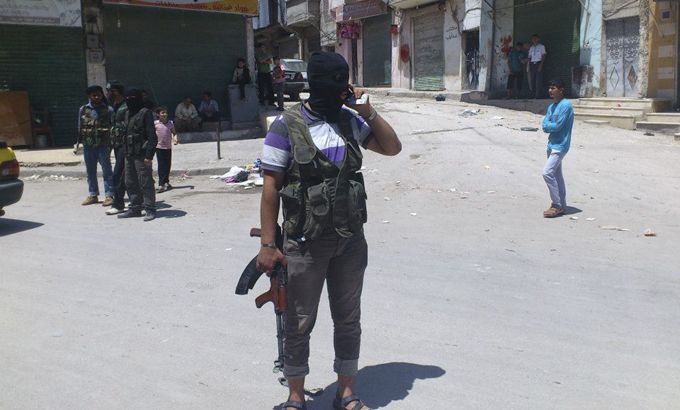Syrian forces renew Aleppo assault
Assad forces said to be massing near commercial capital, as activists report fresh violence across country.

Syrian government forces appear to be preparing for a large assault on the commercial capital of Aleppo, where anti-government activists say helicopter gunships have opened fire on civilians and that the army has massed troops on the city’s borders.
In addition to Aleppo, fresh fighting was also reported on Friday in Idlib and Deraa, activists said.
Syrian President Bashar al-Assad’s forces reportedly renewed ground and aerial combat in and around Aleppo on Friday, extending efforts to crush rebels in Syria’s second-largest city.
According to a spokesman for the rebel Free Syrian Army, Colonel Abdel Jabbar al-Okaidi, around 100 tanks and a large number of military vehicles had arrived outside Aleppo.
Troops stationed on the outskirts of the city fired heavy-calibre mortar rounds on the western neighbourhoods of Salaheddine, al-Sukkari and al-Fardos, while MI-25 helicopter gunships struck al-Sakhour in the east with rockets, several opposition activists in the city said.
“The violence is increasing together with more military forces coming from Hama and Idlib to support the already existing Assad forces in the west of Aleppo for launching more attacks and committing more massacres,” Majid Abdul-nour, an activist, told Al Jazeera.
He said 300,000 people had fled the city and that there was a “huge shortage of food”.
“The city is in a complete paralysis,” he said.
Rebel fighters targeted army roadblocks and security installations, with both sides avoiding close-quarters warfare in the city of 2.5 million people.
Al Jazeera’s Zeina Khodr, reporting from the Turkish-Syrian border town of Masnaa, said activists reported fighting in a number of neighbourhoods in Aleppo.
“We do know that fighting has been going on for the past few days, [with] the Free Syrian Army managing to take control of some neighbourhoods,” she said. “The government is fighting back.”
Thirty-four people were killed in Aleppo and its environs on Thursday, according to opposition activists keeping a tally of casualties in the northern city.
Al Jazeera could not verify the casualty figure from independent sources owing to media restrictions by the Assad government.
On Friday, the Syrian Observatory for Human Rights, a UK-based anti-government rights watchdog, reported that several towns in southern Deraa province had been bombarded, killing at least four people. It also reported that government troops were engaged in violent clashes with armed opposition forces in Idlib province bordering Turkey.
Meanwhile, Samih Maayatah, the Jordanian information minister, confirmed that a child had been killed when Syrian security forces opened fire on a group of refugees fleeing to his country in a border area close to Deraa.
US fears ‘massacre’
The US state department said on Thursday that credible reports of tank columns moving on Aleppo along with air strikes by helicopters and fixed-wing aircraft represented a serious escalation of the government’s efforts to crush the armed rebellion.
“This is the concern: that we will see a massacre in Aleppo and that’s what the regime appears to be lining up for,” spokeswoman Victoria Nuland said.
Nuland said that despite US concern over the violence, the administration did not contemplate providing military.
Reuters has reported that Turkey, Qatar and Saudi Arabia are providing intelligence and weapons supplies to Syrian rebels from inside Turkey, and that the United States is helping coordinate through “middlemen”.
“We do not believe that pouring more fuel on the fire is going to save lives,” Nuland said. “The route out of this is not more violence … the route out of this is an end to the violence and a beginning to a true political transition process.”
Nuland dismissed comparisons between Aleppo and the Libyan city of Benghazi, the cradle of the uprising against Muammar Gaddafi, where warnings of a threatened massacre by Libyan government forces in March 2011 prompted the UN Security Council to authorise military action to protect civilians.
“There are a vast number of differences,” Nuland said, citing lack of a UN mandate, more difficult terrain and the absence of a direct call for help by a unified opposition.
Navi Pillay, the UN human rights chief, meanwhile has urged both the government and the armed opposition to protect civilians and respect international human rights and humanitarian law, “or face the consequences”, according to a statement.
On Friday, the International Committee of the Red Cross announced that it was temporarily relocating some of its foreign staff from Damascus to Lebanon, and was partially suspending operations in Aleppo, due to security concerns.
Another defection
The heavy fighting around Aleppo and the capital Damascus marks a new phase of the violence that has gripped Syria since protests broke out some 17 months ago. It comes after a bomb attack that killed four of Assad’s closest lieutenants in Damascus last week that led some analysts to speculate that the government’s grip was failing.
Meanwhile, in a setback to Assad’s government, Ikhlas Badawi, a parliamentarian, became the latest to announce that she had “defected” to Turkey.
Samir Nashhar, a member of the opposition Syrian National Council, told the AFP news agency that Badawi arrived in Turkey on Thursday, and will now head to Qatar, “which has agreed to receive her”.
In a press conference, Badawi blamed the “Assad regime” for failing the people and called on Syrian parliamentarians and the international community to prevent massacres.
Earlier, one of the most senior figures to defect from Assad’s inner circle, Brigadier General Manaf Tlas, put himself forward on Thursday as someone who could help unify the opposition inside and outside Syria on a plan for a transfer of power.
Tlas, speaking in a newspaper interview in the Saudi city of Jeddah, also said he was looking for support from Saudi Arabia and other powers.